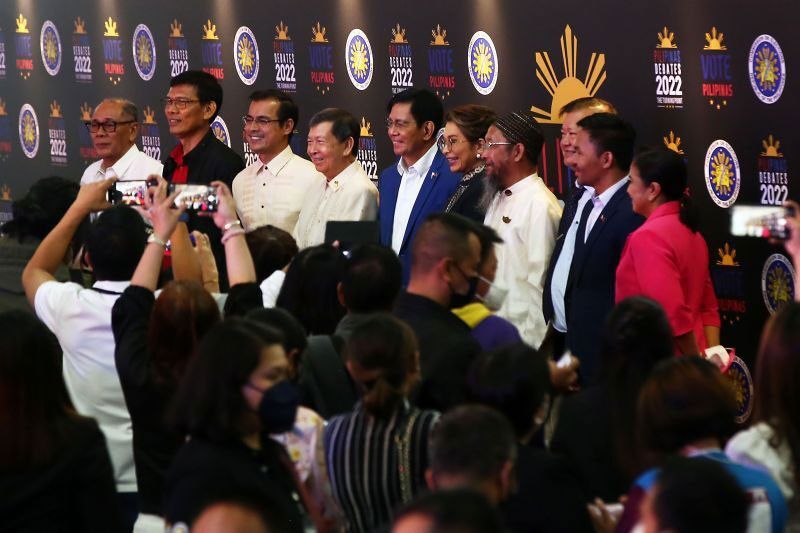Presidential bets suggest revising how ASEAN decides. But will member states buy this?

MANILA, Philippines — During the second round of Comelec-sanctioned debates, some presidential bets suggested proposing a change in how ASEAN comes up with a decision.
The presidential aspirants were asked what they can do to convince the 10-nation regional bloc to stop China's militarization in the West Philippine Sea, a portion of the South China Sea within Philippine exclusive economic zone.
The question comes as the ASEAN has yet to come up with a legally binding Code of Conduct in the South China Sea.
Former defense secretary Norberto Gonzales acknowledged the problem in the procedure of how ASEAN decides as a consensus is needed.
Gonzales said that instead of a consensus, the ASEAN should just make a decision based on the majority so that the Philippines could push for its stand on the West Philippine Sea issue.
Former presidential spokesperson Ernesto Abella agreed with Gonzales, saying that China's incursions can be addressed through consolidating without consensus "but a majority."
"We can talk but when we are looking for now is not an alliance but a statement of cooperation among the ASEAN nations. So we could issue a majority statement," Abella said during Sunday's debate.
Jose Montemayor, meanwhile, said the ASEAN cannot come up with a decision on the South China Sea as Cambodia, Laos and Malaysia "owe" China while only Vietnam, Indonesia and the Philippines are on the same side. He added that Thailand is neutral.
Vice President Leni Robredo suggested that the Philippines, using the arbitral ruling as leverage, should lead and convince the ASEAN to assert the landmark ruling that invalidated China's expansive claims in the South China Sea, including the West Philippine Sea.
Limitations of ASEAN decision making
Aries Arugay, political science professor at the University of the Philippines, said it was good that some candidates know the limitations of ASEAN decision making, but coming up with a consensus has become the norm.
"There is no ASEAN position on a lot of things because that (consensus) has become the practice," Arugay told Philstar.com.
If one country vetoes, the 10-member ASEAN could not release a decision on an issue even if the other member states agree with it.
Explaining the history of why ASEAN decides with a consensus, the political analyst noted that when Cambodia, Laos and Myanmar came in, the new member states felt that they were the minority and they had to be protected.
The older ASEAN members — Indonesia, Malaysia, the Philippines, Singapore and Thailand — were like the "powers" in the regional bloc.
ASEAN minus X
Rather than a majority position, which requires 50% plus one or six out of 10 member states, Arugay said the ideal proposition would be having more countries agree.
With this, Arugay mentioned the "ASEAN minus X" formula, with x being any number of countries who don't agree with a position as long as they are not the bigger number.
This principle would not be a majority but a "super majority" which would be at least two-thirds of the 10 member states, Arugay said.
"The problem with that formula, that proposition, is ASEAN member states are not buying," Arugay said, adding that experts, scholars and progressive ASEAN officials have already proposed this before.
The proposal of Gonzales and Abella of a majority decision in the ASEAN is more of a radical solution, Arugay said.
"If the Philippines will propose that, there are no takers... ASEAN minus X... I don't think it will be something that ASEAN will entertain," Arugay said.
Complexities of diplomacy
In a tweet shortly after the debates Sunday night, Arugay said he was "generally dissatisfied" with the responses of all presidential candidates on foreign policy questions.
"So lacking basic knowledge about how int'l institutions work, the complexities of diplomacy, & what defines our [foreign policy]. This is really bad," Arugay said in a tweet.
Further explaining the complexities of diplomacy, Arugay pointed out Montemayor who seemed to blame Cambodia, Laos and Malaysia for the ASEAN's lack of a definite position on the South China Sea.
"That's not really the way you deal with neighbors especially with ASEAN, we are one community... Hindi tayo dapat nanlalaglag ng kapitbahay natin," Arugay said in an interview with Philstar.com.
On Manila Mayor Isko Moreno's answer that he will go straight to the United Nations General Assembly to enjoin member states to recognize the 2016 arbitral ruling, Arugay noted how the mayor wants to bypass the ASEAN.
"So is he advocating a Philixit (???????? exit) from ASEAN?" Arugay said in a separate tweet Sunday, stressing that the power of the UN lies within the Security Council and not the General Assembly.
Isko #Moreno wants to bypass ASEAN & go to the UNGA which is not where the power of the UN lies (it’s the Security Council). So is he advocating a Philixit (???????? exit) from ASEAN? ????
— Aries Arugay (@ariesarugay) April 3, 2022
- Latest
- Trending





























